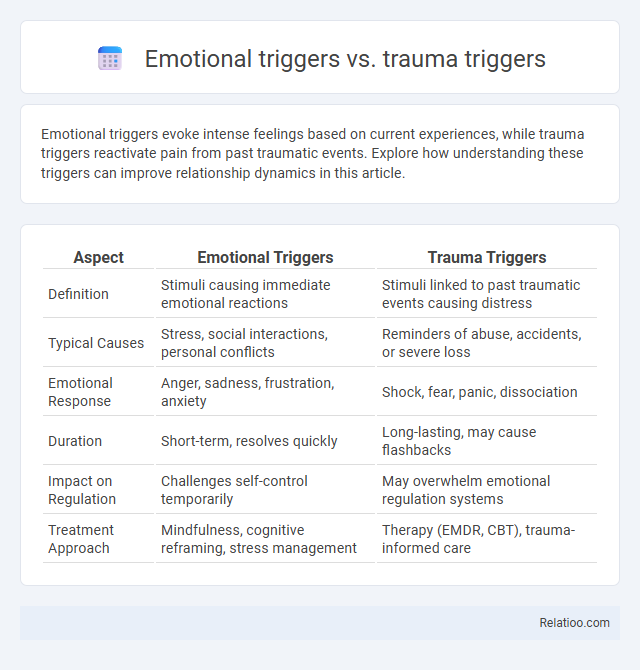Emotional triggers evoke intense feelings based on current experiences, while trauma triggers reactivate pain from past traumatic events. Explore how understanding these triggers can improve relationship dynamics in this article.
Table of Comparison
| Aspect | Emotional Triggers | Trauma Triggers |
|---|---|---|
| Definition | Stimuli causing immediate emotional reactions | Stimuli linked to past traumatic events causing distress |
| Typical Causes | Stress, social interactions, personal conflicts | Reminders of abuse, accidents, or severe loss |
| Emotional Response | Anger, sadness, frustration, anxiety | Shock, fear, panic, dissociation |
| Duration | Short-term, resolves quickly | Long-lasting, may cause flashbacks |
| Impact on Regulation | Challenges self-control temporarily | May overwhelm emotional regulation systems |
| Treatment Approach | Mindfulness, cognitive reframing, stress management | Therapy (EMDR, CBT), trauma-informed care |
Understanding Emotional Triggers
Emotional triggers are specific stimuli like words, situations, or memories that provoke intense feelings rooted in past experiences, distinct from trauma triggers which activate distress linked to severe psychological injury. Understanding emotional triggers involves recognizing patterns in emotional responses and identifying the underlying causes to manage reactions effectively. Differentiating these triggers allows for targeted therapeutic interventions and improved emotional regulation.
Defining Trauma Triggers
Trauma triggers are specific sensory cues or situations that evoke intense emotional or physical reactions linked to past traumatic experiences. Unlike general emotional triggers, which provoke emotional responses based on current stressors, trauma triggers activate deep-rooted memories and sensations associated with trauma, often causing flashbacks, anxiety, or panic attacks. Understanding trauma triggers is essential for trauma-informed care and effective therapeutic interventions targeting post-traumatic stress disorder (PTSD).
Key Differences Between Emotional and Trauma Triggers
Emotional triggers often arise from everyday stressors or unresolved feelings, whereas trauma triggers are specifically linked to past traumatic experiences that evoke intense fear or helplessness. Your emotional triggers may cause mood shifts or anxiety, while trauma triggers can provoke flashbacks, panic attacks, or dissociation. Understanding these key differences helps identify appropriate coping strategies tailored to your emotional health and trauma recovery.
Common Causes of Emotional Triggers
Emotional triggers often arise from common causes such as stress, rejection, or feelings of inadequacy, activating intense emotional responses linked to past experiences. Unlike trauma triggers, which are closely connected to traumatic events and can provoke flashbacks or severe anxiety, emotional triggers tend to be less intense but still disrupt your emotional balance. Understanding these differences helps you identify your triggers and develop healthier coping mechanisms tailored to your specific needs.
How Trauma Triggers Develop
Trauma triggers develop through the brain's association of specific stimuli with past traumatic events, often involving sensory experiences such as sights, sounds, or smells that evoke intense emotional or physiological responses. Unlike general emotional triggers that arise from everyday stressors or feelings, trauma triggers are deeply rooted in the brain's threat response system, particularly within the amygdala, which stores memories linked to fear and danger. Repeated exposure to trauma-related cues reinforces these triggers, leading to heightened anxiety, flashbacks, or dissociative episodes that interfere with daily functioning.
Psychological Impact of Emotional Triggers
Emotional triggers elicit intense psychological responses by activating memories, feelings, or sensations linked to past experiences, often leading to heightened anxiety, stress, or mood swings. Trauma triggers specifically provoke reactions associated with traumatic events, causing symptoms like flashbacks, dissociation, or severe emotional distress that disrupt daily functioning. Understanding the psychological impact of emotional triggers is crucial for effective mental health interventions, as they influence emotional regulation, cognitive processing, and overall well-being.
Recognizing Signs of Trauma Triggers
Recognizing signs of trauma triggers involves identifying intense emotional reactions such as sudden anxiety, flashbacks, or physical symptoms like rapid heartbeat that arise unexpectedly from past traumatic experiences. Unlike general emotional triggers, trauma triggers specifically relate to deep-seated memories and wounds, causing disproportionate distress relative to the current situation. Understanding your unique trauma triggers enables you to develop coping strategies and seek appropriate support to manage these reactions effectively.
Strategies for Managing Emotional Triggers
Emotional triggers arise from everyday stressors that provoke strong feelings, while trauma triggers are intense reminders linked to past traumatic experiences, and triggers broadly refer to stimuli that activate these responses. Effective strategies for managing emotional triggers include mindfulness practices, grounding techniques, and cognitive restructuring to help you regulate your reactions and regain control. Developing personalized coping mechanisms and seeking professional support can further enhance your resilience and emotional well-being.
Healing and Coping with Trauma Triggers
Emotional triggers are responses tied to intense feelings, while trauma triggers specifically evoke memories or sensations related to past traumatic events, causing distress or dysregulation. Understanding the differences helps you develop targeted healing strategies and coping mechanisms to manage trauma triggers effectively, such as grounding techniques, therapy, and mindfulness practices. Prioritizing personalized trauma-informed care supports long-term emotional resilience and recovery.
Seeking Professional Help for Triggers
Seeking professional help for emotional triggers, trauma triggers, and general triggers is essential for effective management and healing. Therapists use tailored approaches like cognitive-behavioral therapy (CBT) and trauma-focused interventions to identify underlying causes and develop coping strategies. Early intervention by mental health professionals enhances emotional regulation, reduces symptom severity, and supports long-term recovery.

Infographic: Emotional triggers vs trauma triggers
 relatioo.com
relatioo.com